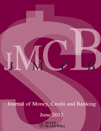
JOURNAL OF MONEY CREDIT AND BANKING
Scope & Guideline
Illuminating the Interplay of Money and Markets
Introduction
Aims and Scopes
- Monetary Policy Analysis:
The journal extensively covers topics related to the formulation, implementation, and impact of monetary policy, particularly in low-interest-rate environments and unconventional monetary policies. - Banking Systems and Financial Stability:
Research often explores the role of banking institutions in the economy, focusing on stability, risk management, and the impact of regulatory frameworks on financial performance. - Credit Markets and Economic Dynamics:
Key studies analyze the behavior of credit markets, including lending practices, credit cycles, and the effects of credit constraints on economic growth and development. - Macroeconomic Interactions:
The journal frequently publishes articles that investigate the interactions between macroeconomic variables such as inflation, employment, and output, providing insights into their implications for monetary and fiscal policy. - Behavioral Economics in Finance:
A growing area of interest involves the incorporation of psychological factors into financial decision-making, particularly how consumer behavior and expectations influence economic outcomes.
Trending and Emerging
- Digital Currencies and Financial Technology:
There is an increasing focus on the implications of digital currencies, including cryptocurrencies, and the role of financial technology in reshaping monetary policy and banking practices. - Impact of Macroeconomic Uncertainty:
Recent studies emphasize the effects of macroeconomic uncertainty on consumer behavior, credit markets, and overall economic stability, highlighting the importance of understanding uncertainty in policy formulation. - Behavioral Insights into Monetary Policy:
Emerging research integrates behavioral economics into the analysis of monetary policy effectiveness, exploring how psychological factors influence consumer and investor responses to policy changes. - Climate Change and Monetary Policy:
An emerging area of research investigates the intersection of climate change and monetary policy, focusing on how environmental factors can influence financial stability and economic growth. - Heterogeneous Effects of Policy Measures:
A trend towards exploring how monetary and fiscal policy measures affect different sectors and demographics differently is gaining momentum, reflecting a more nuanced approach to policy analysis.
Declining or Waning
- Traditional Banking Models:
Research that strictly adheres to classical banking models has become less frequent as newer theories and empirical analyses that incorporate behavioral and structural complexities gain traction. - Currency and Exchange Rate Stability:
While still relevant, there appears to be a waning interest in studies solely focused on currency stability and exchange rate mechanisms, as attention shifts towards digital currencies and their implications. - Static Economic Models:
There is a noticeable decrease in papers that utilize static models without considering dynamic factors or uncertainties, reflecting a broader trend towards more complex and realistic modeling approaches.
Similar Journals

EKONOMICKY CASOPIS
Connecting Theory and Practice in Economic ResearchEKONOMICKY CASOPIS is a distinguished journal published by the Institute of Economics Research SAS and the Institute of Forecasting CSPS SAS, offering a comprehensive platform for the dissemination of innovative research in the field of economics and econometrics. Since its inception in 1978, the journal has been committed to fostering scholarly discourse, showcasing empirical studies, theoretical advancements, and policy analyses that contribute to the understanding of economic phenomena. Although categorized in the Q4 quartile in 2023 and ranking in the lower percentiles within Scopus, EKONOMICKY CASOPIS remains a critical resource for researchers and practitioners seeking to engage with the economic challenges of our time. As the journal continues to evolve through 2024, it invites contributions that align with its objectives of enhancing economic insights and promoting academic discussion in Slovakia and beyond. For researchers looking to publish their work or expand their knowledge, EKONOMICKY CASOPIS serves as a vital resource in the expanding landscape of economic research.
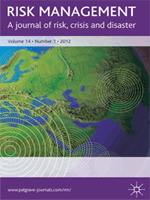
Risk Management-An International Journal
Connecting Theory and Practice in Risk ManagementRisk Management - An International Journal is a premier publication dedicated to advancing the understanding and methodologies of risk management across various sectors, including business, finance, and economics. Published by Palgrave Macmillan Ltd in the United Kingdom, this journal not only maintains a robust presence in the scholarly community but also ranks in the Q2 category for Business and International Management and Finance, as well as Q3 for Economics and Econometrics and Strategy and Management. With its diverse scope and commitment to high-quality research, the journal provides essential insights for academics, practitioners, and students alike, helping to shape the future of risk management practices globally. While not an open-access journal, its rigorous peer-review process ensures that only the most impactful and relevant studies are featured. Covering topics that converge the years from 2006 to 2024, Risk Management represents a vital resource for those looking to deepen their knowledge in this critical field.
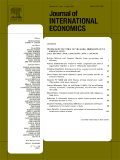
JOURNAL OF INTERNATIONAL ECONOMICS
Advancing global economic insights.JOURNAL OF INTERNATIONAL ECONOMICS, published by ELSEVIER, stands at the forefront of advancing knowledge in the fields of economics and finance. With an esteemed Q1 ranking in both Economics and Econometrics and Finance categories, this journal has established itself as a premier platform for disseminating innovative research. Since its inception in 1971, the journal has provided critical insights into the dynamics of international economic interactions, making it essential reading for researchers, professionals, and students seeking to understand complex global economic issues. With access to high-quality, peer-reviewed articles, readers can stay abreast of the latest trends, methodologies, and empirical findings shaping the economic landscape. Based in the Netherlands, the journal continues to attract contributions from leading experts worldwide, with its rigorous selection process ensuring that only the most impactful research is published, further enhancing its significance in the academic community.

Annals of Economics and Finance
Cultivating Scholarly Excellence in Economics and Finance.Annals of Economics and Finance is an esteemed academic journal published by Wuhan University Journals Press, focusing on the fields of Economics and Finance. Established in 2000, this journal serves as a platform for scholars to disseminate their research findings and insights, contributing to the development of these disciplines through rigorous peer-reviewed articles. Despite currently holding a Q4 ranking in both Economics and Econometrics and Finance categories (2023), it strives to enhance its impact on the academic community and policy-making audiences. While not Open Access, the journal seeks to cultivate a deeper understanding of vital economic theories and financial practices, thereby offering invaluable resources for researchers, professionals, and students alike. With its broad scope, the Annals of Economics and Finance is poised to play a crucial role in shaping contemporary economic discourse up to 2024 and beyond.

American Economic Journal-Macroeconomics
Pioneering Research for Tomorrow's Economic ChallengesAmerican Economic Journal-Macroeconomics, published by the American Economic Association, stands at the forefront of economic research, addressing pivotal macroeconomic issues that shape global economies. With an impressive Scopus rank of #8 out of 288 in its field and a notable 97th percentile ranking, this journal is widely regarded as a top-tier publication, specifically categorized in the Q1 category for Economics, Econometrics, and Finance as of 2023. Operating under ISSN 1945-7707 and E-ISSN 1945-7715, it aims to disseminate high-quality research from 2009 through 2024 and beyond, providing crucial insights into macroeconomic theory and policy. Although the journal currently does not operate under an open access model, it remains a vital resource for researchers, economists, and students seeking to deepen their understanding of macroeconomic dynamics and their implications for economic policy worldwide. The journal's impactful contributions make it an essential read for those striving to influence economic thought and practice.
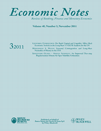
Economic Notes
Fostering Dialogue on Critical Economic IssuesEconomic Notes is a peer-reviewed journal published by WILEY, focusing on the dynamic field of economics and econometrics. With an ISSN of 0391-5026 and an E-ISSN of 1468-0300, this esteemed journal offers a platform for researchers, professionals, and students to explore theoretical advancements, empirical studies, and policy implications within the economic landscape. Established in the United Kingdom, Economic Notes has become a noteworthy publication, currently ranked in the Q3 category in the 2023 Economics and Econometrics quartiles, and situating itself at the forefront of the field with a respectable 60th percentile ranking in Scopus. The journal spans a remarkable convergence of scholarship from 2001 to 2024, fueling academic discourse and providing insights into pressing economic issues. Although it does not provide open access options, it remains a crucial resource for those seeking to enhance their understanding and contribute to economic theory and practice.

JOURNAL OF FINANCIAL SERVICES RESEARCH
Driving impactful research in finance and economics.The JOURNAL OF FINANCIAL SERVICES RESEARCH, published by SPRINGER, serves as a critical platform for scholarly discourse in the fields of finance, accounting, and econometrics. With a dedicated focus on innovative research and rigorous analysis, this journal has maintained a respectable Impact Factor, placing it in the Q2 category for 2023 across multiple academic disciplines including Accounting, Economics, and Finance. Since its inception in 1987, it has contributed significantly to the advancement of knowledge and practice within financial services, making it essential reading for researchers, professionals, and students alike. The journal is based in the Netherlands and hosts contributions that address contemporary issues in financial systems, markets, and institutions. Despite its non-open access format, the journal remains highly relevant, with Scopus rankings indicating its solid position within its peer group, especially in the realms of Economics, Econometrics, and Finance. As the journal approaches its converged coverage through 2024, it aims not only to disseminate high-quality research but also to foster a deeper understanding of the dynamic financial landscape.

International Journal of Financial Studies
Fostering collaboration and insight in financial studies.The International Journal of Financial Studies is a premier publication dedicated to advancing the field of finance through open-access research. Published by MDPI based in Switzerland, this journal offers researchers, professionals, and students a platform to disseminate their findings in an accessible format since its establishment in 2013. With its ISSN of 2227-7072 and a commendable impact reflected in its Q2 ranking in finance, it occupies an influential position among finance-related journals, as evidenced by its 65th percentile rank in Scopus. The journal encompasses a wide array of topics in finance, making it essential reading for those seeking to stay abreast of current research trends and methodologies. As an open-access journal, all articles are freely available, significantly enhancing the visibility and reach of published studies, which is crucial for fostering collaboration and innovation within the global financial community. Published continuously until 2024, the International Journal of Financial Studies is not just a source of knowledge; it is a critical contributor to the progression of financial scholarship.

Applied Economics Journal
Catalyzing change through accessible economic scholarship.Applied Economics Journal is a premier academic publication dedicated to the advancement and dissemination of research in the field of applied economics. Published by Kasetsart University, Faculty of Economics, this journal serves as a vital platform for scholars, professionals, and students eager to explore current economic theories and their practical applications in diverse contexts. With its Open Access policy, the journal ensures that high-quality research is accessible to a global audience, encouraging knowledge sharing and collaboration. Although the journal is in its early stages with a developing HIndex, it is poised to become a key resource in the economic research community, fostering innovative approaches to real-world economic challenges. The journal welcomes submissions that delve into various aspects of applied economics, aiming to enhance understanding and contribute to policymaking and economic strategies across different sectors.
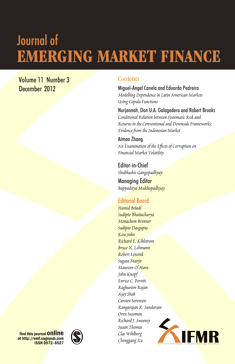
Journal of Emerging Market Finance
Transforming Perspectives on Emerging Market FinanceThe Journal of Emerging Market Finance, published by SAGE Publications India Pvt Ltd, is a premier academic journal that serves as a vital resource for researchers, professionals, and students in the fields of finance and economics. Established in 2002, this journal focuses on the multifaceted dynamics of emerging market economies and their financial systems. With an ISSN of 0972-6527 and an E-ISSN of 0973-0710, it has garnered attention with its respectable Q3 rankings in both the Economics and Econometrics and Finance categories, reflecting its commitment to high-quality research. Despite its limited open-access options, the journal remains a significant platform for scholarly discussions, providing insights on emerging financial instruments, market behaviors, and economic policies in developing economies. As a continuously evolving publication, it aims to bridge the gap between theory and practice, promoting an understanding of the complexities faced in these vibrant markets, ultimately serving the academic community with relevant and impactful research until 2024 and beyond.